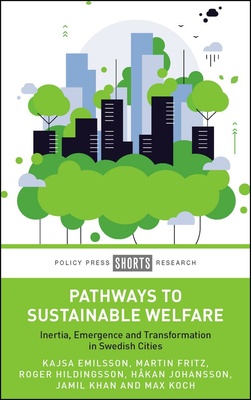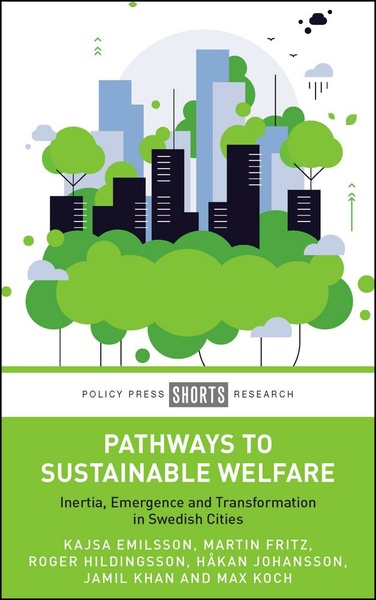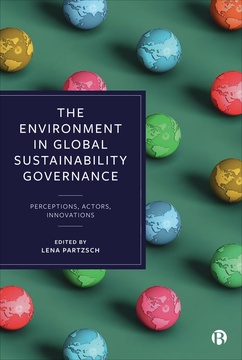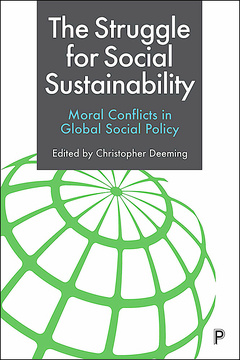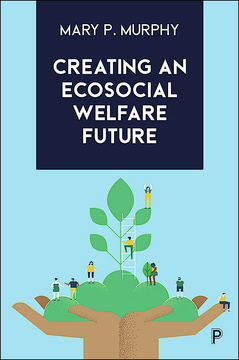Pathways to Sustainable Welfare
Inertia, Emergence and Transformation in Swedish Cities
By Kajsa Emilsson, Martin Fritz, Roger Hildingsson, Håkan Johansson, Jamil Khan and Max Koch
Published
Feb 11, 2025Page count
192 pagesISBN
978-1447372585Dimensions
203 x 127 mmImprint
Policy PressPublished
Feb 11, 2025Page count
192 pagesISBN
978-1447372592Dimensions
203 x 127 mmImprint
Policy PressPublished
Feb 11, 2025Page count
192 pagesISBN
978-1447372592Dimensions
203 x 127 mmImprint
Policy PressAvailable open access digitally under CC-BY-NC-ND licence.
Pathways to Sustainable Welfare critically examines how cities can address the dual challenges of climate change and sustainability while ensuring the welfare of their populations.
Focused on three Swedish cities, it explores the integration of environmental and welfare concerns in local policies, urban movements and public opinions. Based on theories of inertia, emergence and transformation, it identifies factors driving or obstructing sustainable welfare advancements.
This book is a crucial resource for scholars interested in sustainable transformation, urban governance and social policy. It offers frameworks and empirical evidence relevant to academics, policy makers and practitioners seeking to understand and engage in urban sustainable welfare development.
“In the face of calamitous climate collapse, the case for eco-social policy – the simultaneous pursuit of environmental and social goals – is now well understood. This book contributes to understanding how to achieve that, by revealing the potential of cities to pioneer radical policies drawing on research in Sweden’s largest cities. It clearly depicts both hope and despair in undertaking such a momentous transformation.” Ian Gough, London School of Economics and Political Science
“A much-needed in-depth analysis of challenges and enablers associated with integrating welfare and ecological issues in cities offering guidance and inspiration to academics, policy makers and citizens alike.” Milena Büchs, University of Leeds
“Advocates of ecosocial transformation will find this book’s creative exploration of Swedish local government policy, civil society framing and public attitudes very useful. Its Polanyian understanding offers relevant lessons to everyone struggling for a sustainable, just future.” Mary Murphy, Maynooth University
“This theoretically novel and empirically rich book is essential reading not only for scholars and students interested in sustainable welfare and eco-social policies, but also for urban planners seeking to reconcile social and ecological dimensions of sustainability.” Tuuli Hirvilammi, Tampere University
“A truly informative book that gives great insight into how to enable the changes we need in cities to address climate change together with supporting communities.” Harriet A. Bulkeley, Durham University
Kajsa Emilsson is Researcher and Senior Lecturer in the School of Social Work at Lund University. She studies public attitudes, political participation, and the role of economic elites in sustainable welfare.
Martin Fritz is head of the junior research group 'Mentalities in Flux (flumen)' at Friedrich Schiller University Jena. His research includes eco-social attitudes, sustainable welfare and socio-structural analyses.
Roger Hildingsson is Senior Researcher in Political Science at Lund University. He studies environmental politics, sustainability governance and climate change including studies of industrial decarbonisation, urban sustainability and climate futures.
Håkan Johansson is Professor of Social Work at Lund University. His research addresses urban social and environmental movements and civil society organisations, including the study of civil society elites.
Jamil Khan is Associate Professor of Environmental and Energy Systems Studies at Lund University. His research includes urban climate governance, climate policy analysis and eco-social integration.
Max Koch is Professor of Social Policy and Sustainability in the School of Social Work at Lund University. His research addresses the social and environmental implications of capitalist development. He has published widely on sustainable welfare and degrowth.
1. Introduction
2. Theories of stability and change
3. Local government and eco-social integration
4. Civil society framings of sustainable welfare
5. Public attitudes and dispositions of sustainable welfare
6. Conclusion







